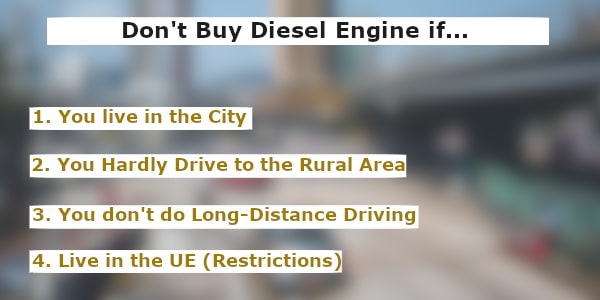Why do Diesel Engines Consume Less Fuel? (Explained)
Becasue of the fuel economy and immense power, diesel engines attract a fair audience.
Many people ask why diesel engines consume less fuel. Is there a secret in their construction, or is the diesel fuel composition different from gasoline? Both of these are valid questions, and they need simplified answers.
As a guy who is crazy about diesel engines, I will tell you today what makes them so fuel-efficient.
Why Do Diesel Engines Consume Less Fuel?
Diesel engines consume less fuel, because of their construction and the way diesel fuel works. A diesel engine does not use spark plugs to ignite the fuel inside the combustion chamber. Instead, the fuel is sprayed into tightly compressed air. The hot air reacts to the fuel vapors and small explosions take place, that drive the car into motion.
Moreover, diesel fuel has slow-burning properties, meaning less of it is wasted, and more of it is used to produce power. On the other hand, gasoline burns fast and sometimes leaves the cylinder without igniting properly. The spark plugs in this engine ensure that the combustion process takes place quickly.
Many people ask how to effectively warm up a Diesel engine. Get to know it in this post.
Why does Diesel Engine Sometimes Consume More Fuel than Gasoline Engine?
Diesel engines sometimes consume more fuel than gasoline when they’re not properly warmed up. Diesel engines need to be brought to their optimum running temperature. If you run them cold, you are losing out on all their benefits.
Why is that so? Well, the answer is simple, and I discussed it above.
Diesel fuel needs hot compressed air to ignite; if it isn’t there, the fuel goes to waste in the exhaust. Sometimes half of it burns, and the other half is misspent. You can see the result of that in the form of thick black smoke. Therefore, as a diesel car owner, it is your responsibility to rev up the engine, warm it up to the optimum temperature and then go out on a drive.
Read it: Can a Car Battery Die while Driving? How to Prevent it?
How Much Less Fuel Does a Diesel Engine Consume?
The diesel engine consumes 15-20% less fuel compared to a gasoline engine. For example, if a gasoline car uses 4 gallons per 100 miles, then diesel will do the same distance using 3,2 gallons or less.
Also, if you are comparing the two fuels in city driving, you might not see a big difference. However, when you get on the highway and drive for long distances, you will find that the diesel runs smoother and gives you even better mileage.
The low rev ranges of a diesel engine and its immense low-end torque help with fuel efficiency.
On the highway, the difference between a gasoline and diesel engine will be even more pronounced. That is because, over there, acceleration is your best friend and diesel engines have lots of it.
As a result, you might experience 40% lesser fuel consumption and a comparable mileage.
Trending Video: How to Easily Bring Back to Life any Old Car Battery and Save Tons of Money (click to watch)
Does Diesel Consume Less Fuel Than Gasoline, Because of its Calorific Value?
Both diesel and gasoline fuels have a similar calorific value. So, to say that diesels consume less fuel solely because of that is untrue.
In reality, it is the density that diesel fuel has, which contributes to its amazing fuel-efficient properties. Gasoline has a calorific value of 45.5 MJ/kg, and diesel is rated at 45.8 MJ/kg. There is not much difference here. However, diesel fuel is 20% denser and therefore it packs 15% more energy compared to its competition.
In numbers, it looks something like this: 36.9 MJ/liter for diesel and 33.7 MJ/liter for gas.
Therefore, you could get more power out of your diesel engine with the same amount of fuel and better combustion.
What about Diesel lifetime compare to gas and hybrid engines? Here’s a post about it.
Does Torque Make Diesel Engine Consume Less Fuel?
The answer to that is yes, but it all depends on the way you drive and how gentle you are with the throttle. Diesel engines provide amazing low-end torque, which makes them ideal for acceleration.
Such a characteristic comes in handy on long-distance journeys and also when you are driving in the city. You can achieve a certain speed faster than a gasoline engine, meaning you can be gentle with your foot and maintain your momentum.
On the other hand, gasoline cars are great at high speeds but struggle a bit with acceleration. It’s not like they can’t accelerate at all, but they can’t compare with a diesel in this department.
So, if you are stuck in traffic or driving in a crowded street, a diesel can give you better mileage. It will require less effort to accelerate, meaning you won’t feel the need to touch higher RPMs. As a result, you will save fuel.
Read it: 5 Serious Reasons Why You Shouldn’t Fuel up with Car on
Why Might a Diesel Engine Cost You More in the Long-Run Even Though it Consumes Less Fuel?
Diesel engines have many benefits for you, but sometimes these advantages are overshadowed by a few disadvantages. The biggest one is high fuel costs.
Diesel fuel is widely used by the transport industry. In fact, entire economies run on trucks that transport goods from one place to another. These heavy commercial vehicles use diesel as fuel, and rightly so because diesel provides them a lot of benefits.
However, as a result, diesel is sold at a higher price than gas. On average, diesel fuel costs are 10-15% higher than that of gasoline. Such is the case with almost every country around the world. In some places, the costs are even higher because of environmental taxes.
Therefore, even though diesel engines are fuel-efficient, they are sometimes more expensive to run. The fuel costs associated with them are too high, and it neutralizes the benefits achieved in other areas.
When is Diesel Engine not for You?
The diesel engine is not meant for somebody that resides in the city and hardly drives to rural areas, or someone who doesn’t do long-distance driving. The real advantages are only reaped when you travel to long distances and carry lots of weight.
Moreover, if you are living in Europe, and you own a diesel or you intend on buying one, then you should reconsider. That is because the EU has placed several restrictions on diesel vehicles, and soon, they will be phased out completely. It would be detrimental buying or owning a diesel in such times. You would be better off getting a gasoline hybrid or an EV to get similar benefits.
However, if you belong to the trucker’s community, then there are still some green pastures for you. You can enjoy the diesel engine for a longer time, but you would still have to give it up sooner rather than later.
Also, if you are an environment freak and working to reduce the effects of climate change, then diesel is not for you. The advantages of a diesel engine won’t matter because they produce more carbon emissions than a gasoline engine.







![Do Diesel Cars Need to Be Driven Regularly? [Solved]](https://yourgreatcar.com/wp-content/uploads/2021/12/fda-min-150x150.jpg)